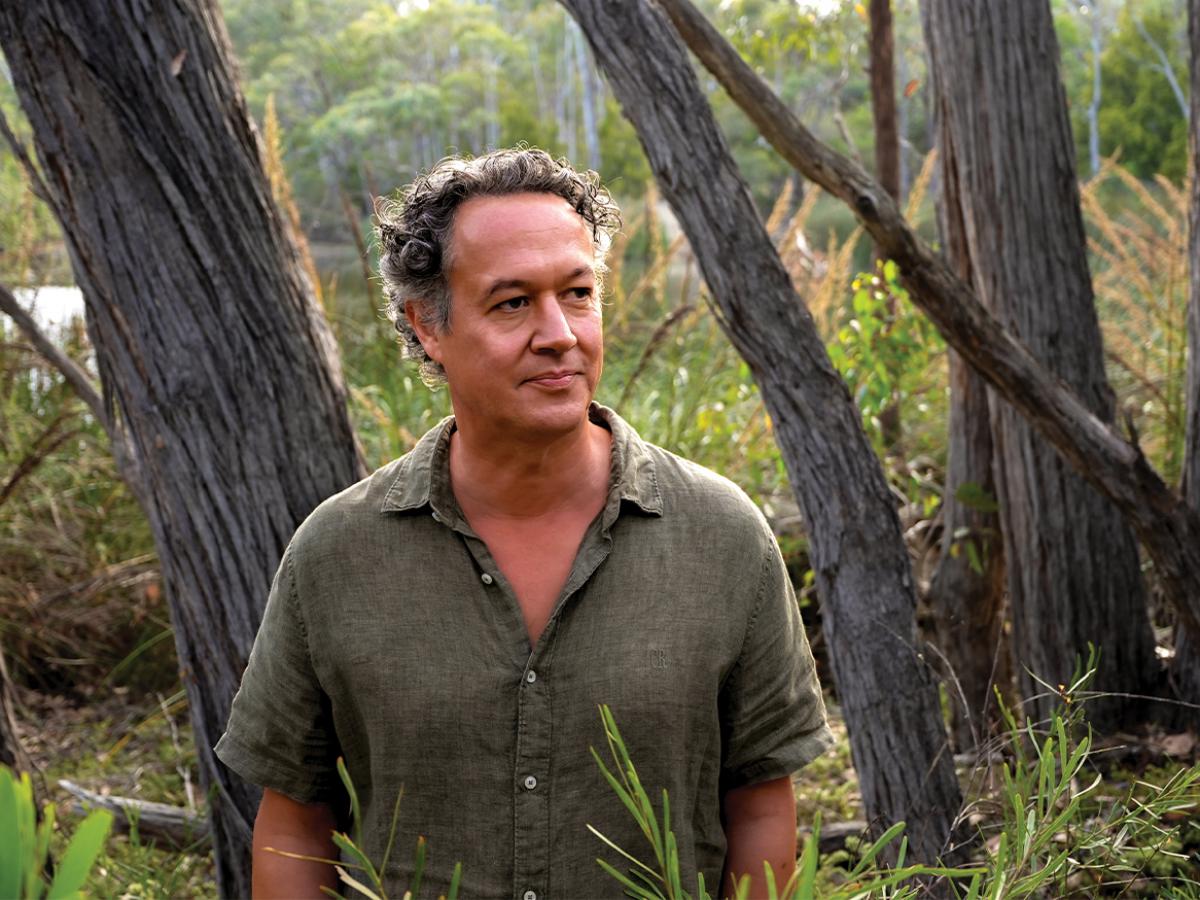The (environmental) future of the planet

In our recent time-themed issue of Lumen, we asked readers to tell us what concerned or excited them about the future.
The environmental state of our planet was prominent in the responses.
In this story, the Director of the University’s Environment Institute, Andy Lowe, aims to address those concerns, and explore some of the work being done by the University and its communities to improve our future.
Climate change. Biodiversity loss. A disconnect with nature. An unsustainable planet. Water insecurity. Waste and pollution. Government inaction.
These were the themes that echoed through the responses Lumen readers sent about their fears for our future. They are concerns the Environment Institute of the University shares and is working to address.
The readers’ disquiet was clearly very real and deeply felt. One reader imagines mosquitoes at the peak of Mt Everest after the ice and snow has gone. Others write of their concerns for the future of their descendants.
“The dissociation of humanity from Earth has already happened… mega cities have replaced natural habitats, leading to a profound disconnection,” one reader writes.
“It frustrates me that despite clear warnings, meaningful action still feels too slow and inadequate,” writes another.
“The future is terrifying – I have five kids. I wish they didn’t have such a bleak, hot, dry, catastrophic future ahead of them,” writes a third.
So, what can we do, and what are we at the Environment Institute and the University doing?
Perhaps the best way to address readers’ concerns is by giving a brief oversight of our activities in each of their primary themes. Further details – and how you can help – can be found at the link at the end of the story.
"I find it reassuring to know there is a huge community of people world-wide, each of them working in their own way to seek solutions and improve our future"

Climate change
We are facing a climate future which is increasingly hot and dry, with temperatures rising and rainfall declining. The increase in extreme temperatures is especially alarming, with the potential for catastrophic impacts not only on human health and wellbeing but also on ecosystem health and biodiversity.
Our researchers are formulating and enacting evidence-based solutions to protect natural and human systems and prepare for the change. Our work includes examining the impact of urban canopy levels, the impact of climate change on human health, examining sustainable fire management and other necessary climate change adaptation.
Biodiversity loss
Mitigating future biodiversity losses and maintaining resilient ecosystems in the face of shifting climate is a significant challenge, and we are working to provide the context, tools and policy guidance needed. This includes work to restore ecosystems such as our lost Australian oyster reef system as well as restoration of seagrass in Gulf St Vincent off Port Gawler.
We are also reviewing threats to the Great Artesian Basin springs, and we are engaged in a series of research projects to gain a better understanding of how animals and plants survived climate and environmental shifts of the past. This includes work tracing 6,000 years of Adélie penguin history in Antarctica, and the decline of southern elephant seals over the past 1,000 years.
Nature disconnect
We seek to foster a sense of shared responsibility for the preservation of our natural world and inspire collective action towards a more sustainable future through events, public lectures, podcasts, citizen science and actively involving the public in our research.
Citizen science projects underway include: learning more about our wild echidna populations through the EchidnaCSI app; improving bandicoot protection by discovering unoccupied blackberry habitat within bushland for relocation of this endangered species; reef and dune restoration projects; and the development of a new citizen science platform launched last year (SciStarter) which links volunteers with projects.
Unsustainable planet
We explore the impact of human activities on the environment and ways to mitigate and prevent pollution through innovative approaches to waste management and consumption. Our research also seeks to understand how social factors influence environmental issues, and how best to engage communities in environmental decision making.
Research ranges from examining ways in which communities engage with the issue of climate change, to agricultural risk management, and a collaboration with schools and communities in Arnhem Land to find solutions for the plastic pollution problem impacting the shoreline – establishing recycling systems which converts the waste into skateboards, Frisbees and sports equipment.

Water insecurity
Water resources are a key strategic asset for all nations worldwide. We undertake research to support the sustainable management of these resources. Researchers involved include hydrologists, ecologists, biogeochemists, engineers, architects, modellers, economists and social scientists who work in collaboration with the water sector and water users.
Our team helped to create the healthy Coorong action plan restoring its natural state of healthy vegetation, and abundant and diverse waterbirds, fish and plants. As global citizens, we also researched the potential for expanding equitable use of urban rainwater in South Asia and possibilities for upscaling harvesting projects.
Waste and pollution
Pollution and emerging contaminants are increasingly urgent research areas, with toxic substances like pesticides, microplastics, e-waste and perfluoroalkyl and polyfluoroalkyl chemicals (PFAS) spreading globally. Environment Institute researchers are studying contaminant pathways, assessing their environmental impacts, and developing strategies to monitor, mitigate and prevent pollution through supply chain redesign, changing consumption patterns and advanced technologies.
Research includes efforts to reduce CO2 emissions and nutrient and pesticide pollution from vineyards and canola fields; studying the amount and type of plastic pollution in 38 freshwater lakes and reservoirs across the globe, and; quantifying the presence of ingested microplastics in Australian seafood market fish species.
Government inaction
The Environment Institute works in partnership with local and international governments, communities and industry to deliver solutions to safeguard the planet’s land, water and air resources. These partnerships play a vital role in promoting collaboration and shared accountability, uniting diverse perspectives, expertise and resources, and ensuring we can deliver impactful solutions and lasting change.
The research of our members also plays a significant role in the development and reform of environmental laws and policies, and the development of innovative tools and technologies to drive broad systemic change.
Research has included programs to combat wildlife and environmental crimes; the role of legal frameworks for biodiversity; climate-driven changes to wildfire regimes and laws; a benchmarking study of Adelaide’s urban forest with a five-year plan to increase tree canopy and measure urban heat and plant diversity to set the foundation for necessary future targets.
Conclusion
Our Environment Institute involves researchers hailing from all faculties of the University of Adelaide. This multi-disciplinary approach focuses on safeguarding the planet’s land, air and water resources, working for outcomes with industry, government and communities.
Each of our members are involved in further expansive networks of citizen scientists, students and researchers, with influence that extends across our planet, on every continent, in each environment.
While it is fair and reasonable to have concerns for our environmental future, and despair at the slow pace of governmental response, we should not lose hope.
I find it reassuring to know there is a huge community of people world-wide, each of them working in their own way to seek solutions and improve our future.
This buoys me and gives me continuing hope.
Professor Andrew Lowe is Director of the University of Adelaide’s Environment Institute. He has a PhD in plant evolutionary biology (1997) from the University of St Andrews, UK. Andy has helped secure more than $250m of funding and he has published more than 250 scientific papers and books with more than 23,000 citations.
Story by Andy Lowe and Mark Douglas, Editor of Lumen. Main image created by Lachlan Wallace, Communications Officer for the University of Adelaide, using ChatGPT. Additional images supplied.
For further details of the wide-ranging work of the Environment Institute, and how you can be involved as a researcher, volunteer or donor, please visit our University website, follow us on social media to keep up to date on events and actions, or consider becoming a citizen scientist through website SciStarter.
